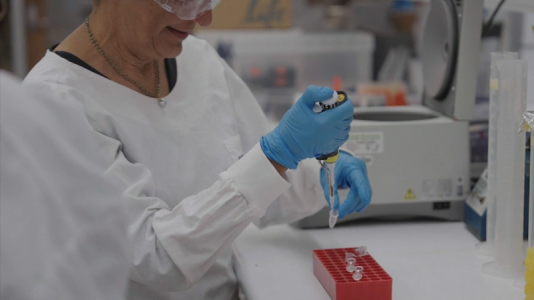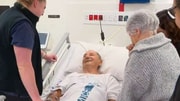World-first diabetes drug could make insulin injections a thing of the past—what’s next?
By
Maan
- Replies 0
A breakthrough in diabetes treatment is unfolding, with researchers pushing the boundaries of science.
What started as a promising experiment could revolutionise the way we treat type 1 diabetes, potentially reducing the reliance on daily insulin injections—and maybe even halting the disease altogether.
A groundbreaking development in diabetes treatment took place in Queensland, as researchers began world-first human clinical trials for a new drug aimed at treating type 1 diabetes.
The innovative treatment could potentially reduce the need for insulin injections and may even stop the disease from progressing altogether.
Cecelia Wickstroem Giraldi, a Brisbane mother of two, was one of the first participants in the trial after she was diagnosed with type 1 diabetes following gestational diabetes during her pregnancy.
'That can be a burden and that can be really difficult,' she shared about the ongoing struggles with her health.
Giraldi was among the 120,000 Australians diagnosed with type 1 diabetes last year.
Type 1 diabetes occurs when the immune system mistakenly attacks the insulin-producing cells in the pancreas.
Professor Ranjeny Thomas from the University of Queensland explained: 'The current treatment is insulin, which really just replaces what's wrong.'
However, with the new trial drug, ASITI-201, there could be a change on the horizon.
This new drug has been 25 years in the making, with promising results already seen in mice.
Using a combination of protein and cells from the pancreas, along with vitamin D, the drug aims to reprogram the immune response to stop the body from attacking the insulin-producing cells.
'We're trying to reduce the requirement for insulin by stopping that attack on the cells,' said Professor Thomas.
The clinical trials are expanding, and researchers are now looking for 31 additional participants.
Participants must be over 18 years old and have been diagnosed with type 1 diabetes within the past five years.
The drug offers hope for many living with type 1 diabetes, as it could drastically improve their quality of life by lessening or eliminating the need for frequent insulin injections.
This research has opened doors to new possibilities in diabetes treatment, and the future is looking promising for those affected by the condition.
In a previous story, we explored the growing threat of scammers targeting people with diabetes.
With the rise in new treatments and breakthroughs, it's more important than ever to stay vigilant.
Be sure to check out how these scams are affecting the community and what you can do to protect yourself.

With such promising results from early trials, could this new drug be the game-changer for people with type 1 diabetes? Share your thoughts in the comments below!
What started as a promising experiment could revolutionise the way we treat type 1 diabetes, potentially reducing the reliance on daily insulin injections—and maybe even halting the disease altogether.
A groundbreaking development in diabetes treatment took place in Queensland, as researchers began world-first human clinical trials for a new drug aimed at treating type 1 diabetes.
The innovative treatment could potentially reduce the need for insulin injections and may even stop the disease from progressing altogether.
Cecelia Wickstroem Giraldi, a Brisbane mother of two, was one of the first participants in the trial after she was diagnosed with type 1 diabetes following gestational diabetes during her pregnancy.
'That can be a burden and that can be really difficult,' she shared about the ongoing struggles with her health.
Giraldi was among the 120,000 Australians diagnosed with type 1 diabetes last year.
Type 1 diabetes occurs when the immune system mistakenly attacks the insulin-producing cells in the pancreas.
Professor Ranjeny Thomas from the University of Queensland explained: 'The current treatment is insulin, which really just replaces what's wrong.'
However, with the new trial drug, ASITI-201, there could be a change on the horizon.
This new drug has been 25 years in the making, with promising results already seen in mice.
Using a combination of protein and cells from the pancreas, along with vitamin D, the drug aims to reprogram the immune response to stop the body from attacking the insulin-producing cells.
'We're trying to reduce the requirement for insulin by stopping that attack on the cells,' said Professor Thomas.
The clinical trials are expanding, and researchers are now looking for 31 additional participants.
Participants must be over 18 years old and have been diagnosed with type 1 diabetes within the past five years.
The drug offers hope for many living with type 1 diabetes, as it could drastically improve their quality of life by lessening or eliminating the need for frequent insulin injections.
This research has opened doors to new possibilities in diabetes treatment, and the future is looking promising for those affected by the condition.
In a previous story, we explored the growing threat of scammers targeting people with diabetes.
With the rise in new treatments and breakthroughs, it's more important than ever to stay vigilant.
Be sure to check out how these scams are affecting the community and what you can do to protect yourself.
Key Takeaways
- Researchers in Queensland began world-first clinical trials for a type 1 diabetes drug.
- The drug may reduce insulin dependence and possibly stop the disease from progressing.
- Cecelia Wickstroem Giraldi, diagnosed with type 1 diabetes, is one of the trial participants.
- The drug uses proteins and vitamin D to reprogram the immune response and stop cell attacks.
With such promising results from early trials, could this new drug be the game-changer for people with type 1 diabetes? Share your thoughts in the comments below!








